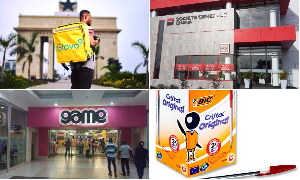- Home - News
- TWI News | TV
- Polls
- Year In Review
- News Archive
- Crime & Punishment
- Politics
- Regional
- Editorial
- Health
- Ghanaians Abroad
- Tabloid
- Africa
- Religion
- Election 2020
- Coronavirus
- News Videos | TV
- Photo Archives
- News Headlines
- Press Release
Business News of Tuesday, 12 September 2006
Source: GNA
ECOWAS to be transformed into a Commission
Accra, Sept. 12, GNA 96 The Economic Community of West African States (ECOWAS) is currently being transformed into a Commission headed by a President to enable it to better adapt to the international environment and play its role effectively.
The Commission, which would start in January 2007, would also have a Vice President and seven Commissioners.
Opening a three-day sensitization seminar, Mrs Shirley Ayorkor Botwe, Deputy Minister of Foreign Affairs, Regional Cooperation and NEPAD, said the establishment of the Commission would be guided by principles like solidarity, equity and community spirit to foster integration and development.
The sensitization seminar, attended by representatives of the ECOWAS member States, would disseminate information to the citizens, who have remained largely ignorant about its activities due to the poor level of information available to them.
ECOWAS was established on May 28, 1975 in Lagos, Nigeria, to promote cooperation and integration, leading to the establishment of an economic union in West Africa in order to raise the living standards of its people.
The members are Benin, Burkina Faso, Cape Verde, C=F4te d'Ivoire, The Gambia, Ghana, Guinea, Guinea Bissau, Liberia, Mali, Niger, Nigeria, Senegal, Sierra Leone and Togo. It has its Headquarters in Abuja, Nigeria.
It was also to ensure economic growth, foster relations among member States and contribute to the progress and development of Africa. Ms Botwe noted that after 31 years of its inception, ECOWAS still faced developmental challenges and problems which included corruption, mismanagement, low investment and foreign debt and said the Commission would enhance their speedy remedy for development. Migration, she said, had become a major problem to ECOWAS as remittances from citizens of member states living abroad constituted a major part of government revenue.
=93In this regard, our Governments must develop an effective plan of action to deal with the broad range of migration issues in the West Africa Sub-Region such as strengthening national migration expertise and managements.=94
Ms Botwe said since regionalism was a potent developmental tool, ECOWAS had re-engineered its approach to involve the West Africa business community and civil society organizations in the regional integration process.
She mentioned the West African Gas Pipeline to link Nigeria, Benin, Togo and Ghana for the first phase; the West African Power Pool project; telecommunication; railways and road transport as some of the transit facilitation established under the NEPAD framework.
The bedrock for the integration process is for trade liberalization, free movement of persons, goods, services and transport yet the numerous road blocks and check points on international highways continue to impede their free flow.
=93Whilst it is true that some of these road blocks are necessary for security reasons, some of them have nothing to do with national security or public order; they are simply to intimidate and harass innocent travellers.=94
She said in an effort to tackle this problem, Ghana had taken the initiative to establish a National Monitoring Committee, which made random checks at the various borders to facilitate free movement. Dr Andrienne Diop, Director of Communications of the ECOWAS Secretariat, said information dissemination was vital to regional development and involvement of citizens in the integration process. She said information and documentation centres had been established in six ECOWAS member States in compliance with the policy for publicizing the organization's institutions and programmes for citizens to have direct access to information on ECOWAS. Dr Diop said Ghana had been chosen as one of the first beneficiaries of this policy and charged the media to cover more on positive development projects of ECOWAS.
=93Our media is unfortunately being influenced by the West by being interested in covering sensational news to the detriment of developmental issues of our continent.=94 She said the challenge of informing the citizen should not be seen as exclusive to the Secretariat and the Ministries responsible for ECOWAS affairs alone.
The media should also see itself as included in the process as an expression of its social responsibility to the countries and the Sub-Region to accelerate the achievement of the noble objectives. 12 Sept. 06










